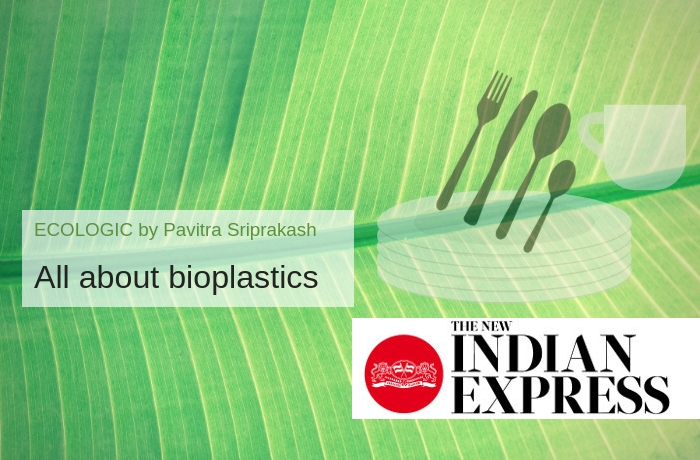29-Sept-2018, Pavitra Sriprakash, Director and Chief Designer, Shilpa Architects Planners Designers Pvt. Ltd, in her weekly column on Sustainability, writes about bioplastics, and the primary issue with them – their disposal.
Read the Full Article below or from the New Indian Express Site.
The ongoing innovations and developments in the space of bioplastics seems glacial in comparison to the frenzy with which plastics are being banned across cities and countries around the world. By 2019 Chennai will join the list of cities that have banned single use plastic products. Meanwhile there is much to be said about finding alternatives to the material — and quickly so.
The issue with plastics is their disposal. Bioplastics are derived from renewable and sustainable sources and said to ‘Biodegrade’ easily. Arguments have been made that only 9% of all plastic manufactured are recycled, and their wastes are only increasing with continued use. Since bioplastics are made from natural sources such as vegetable fats, oils, corn starch, straw, wood chips, and food waste, the hope is that it will be absorbed more easily back into earth and not rot in a landfill over the next 1,000 years.
There is apprehension that bioplastics may not be the silver bullet and there will be limitations. There are arguments that biodegradation may not happen with any more ease and safety, and problems with their disposal may not be any different from those faced with conventional fossil-fuel derived plastics. Still it is important to understand some technological aspects of biodegradability to build on the positives.
The word to watch out for is ‘Oxo-fragmentable’. Products that are oxo-fragmentable are made from conventional plastics and only supplemented partly with additives that help fragment the materials. These do not break the polymers fully to a biodegradable level. In fact, they increase the problems by disintegrating into microplastics, which more often than not wind up in our water sources and enter our food chain.
These starch-based bioplastics are strikingly similar to common plastics used daily and promise to replace regular single use plastic carry bags once and for all. Apart from the obvious facts of being from a natural source and not containing petroleum based raw materials, biodegradable bioplastics could be totally compostable. They dissolve in high temperature water; and are endowed with the look, feel and durability of conventional plastics.
Most importantly biodegradable plastics even when laminated are recyclable. It’s a really good feeling to know that soon shopping bags, laundry bags, garbage lining bags and other places that have films and sheets of plastic will start using this material over conventional plastic. But until then carry your canvas ‘catch-all’ bag always, and remember to check if the plastic is OXOfragmentable or BIOdegradable. Your awareness will make a huge difference!



